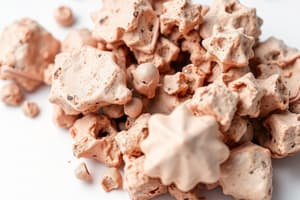Podcast
Questions and Answers
The type of property that specifically depends on the amount of a substance that is present is which of the following?
The type of property that specifically depends on the amount of a substance that is present is which of the following?
- Intensive property
- Physical property
- Chemical property
- Extensive property (correct)
All of the following are extensive properties:
All of the following are extensive properties:
- Size (correct)
- Weight (correct)
- Color
- Length (correct)
Which of the following is an example of a chemical property?
Which of the following is an example of a chemical property?
- Melting point
- Color
- Flammability (correct)
- Density
All of the following are chemical properties:
All of the following are chemical properties:
Which of the following is an example of a chemical change?
Which of the following is an example of a chemical change?
A physical property can be observed without changing the composition of matter.
A physical property can be observed without changing the composition of matter.
All of the following are physical properties:
All of the following are physical properties:
Which of the following is an example of a physical property?
Which of the following is an example of a physical property?
Which of the following examples is considered a physical change?
Which of the following examples is considered a physical change?
When water becomes ice, it undergoes a physical change based on its:
When water becomes ice, it undergoes a physical change based on its:
Which of the following is NOT a physical property?
Which of the following is NOT a physical property?
When a physical property is observed, the identity of the substance does not change.
When a physical property is observed, the identity of the substance does not change.
Which of the following is a physical change?
Which of the following is a physical change?
If two substances are mixed together and as a result, an odor is produced, this is evidence of a:
If two substances are mixed together and as a result, an odor is produced, this is evidence of a:
Sugar and water, with appropriate heat, can create caramel. In this example, sugar is undergoing a __________.
Sugar and water, with appropriate heat, can create caramel. In this example, sugar is undergoing a __________.
The following is an extensive property:
The following is an extensive property:
The following is an intensive property:
The following is an intensive property:
The following is an example of a chemical property:
The following is an example of a chemical property:
Flashcards are hidden until you start studying
Study Notes
Extensive Properties
- Depend on the amount of substance present.
- Examples include size, weight, and length.
- Mass is specifically identified as an extensive property.
Intensive Properties
- Do not depend on the amount of substance present.
- Characteristics such as melting point, temperature, and color are intensive properties.
Chemical Properties
- Relate to a substance's ability to undergo chemical changes.
- Flammability, reactivity, and acidity are notable examples.
- Water reactivity and heat of combustion also qualify as chemical properties.
Physical Properties
- Can be observed without changing the composition of matter.
- Include texture, density, and solubility.
- Boiling point, melting point, and odor are specific physical properties.
Changes in Matter
- Physical changes do not affect the identity of the substance; examples include boiling water and freezing juice.
- Chemical changes result in the production of new substances and can include reactions that produce odor or color changes.
- The formation of rust exemplifies a chemical change.
Characteristics of Changes
- Freezing point represents the physical change when water turns into ice.
- Chopping wood, bending metal, and cutting a cake are all examples of physical changes.
- A chemical change occurs when sugar and water create caramel under heat.
Summary of Properties
- Combustibility is identified as a chemical property, contrasting with physical properties.
- The identity of substances remains unchanged during physical property observations.
Studying That Suits You
Use AI to generate personalized quizzes and flashcards to suit your learning preferences.




